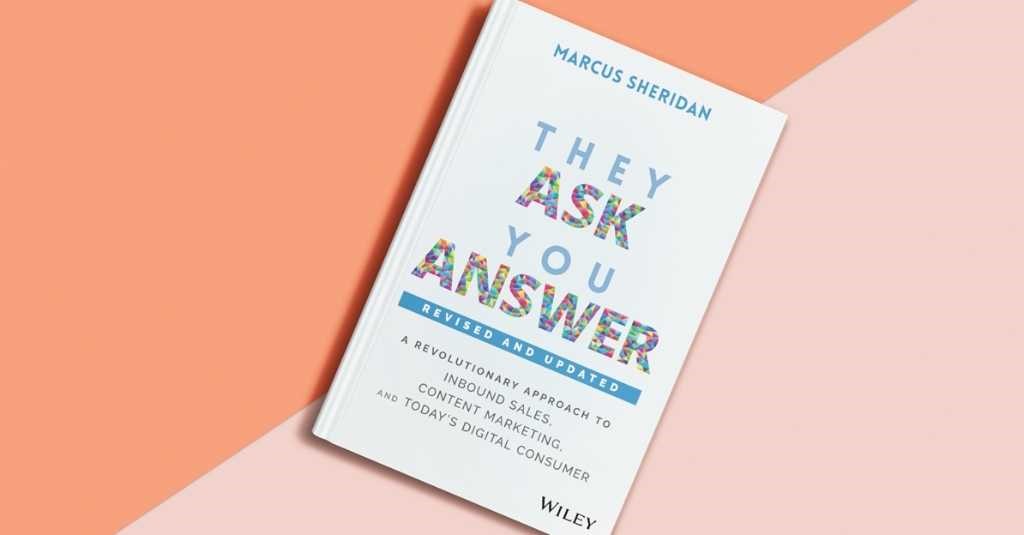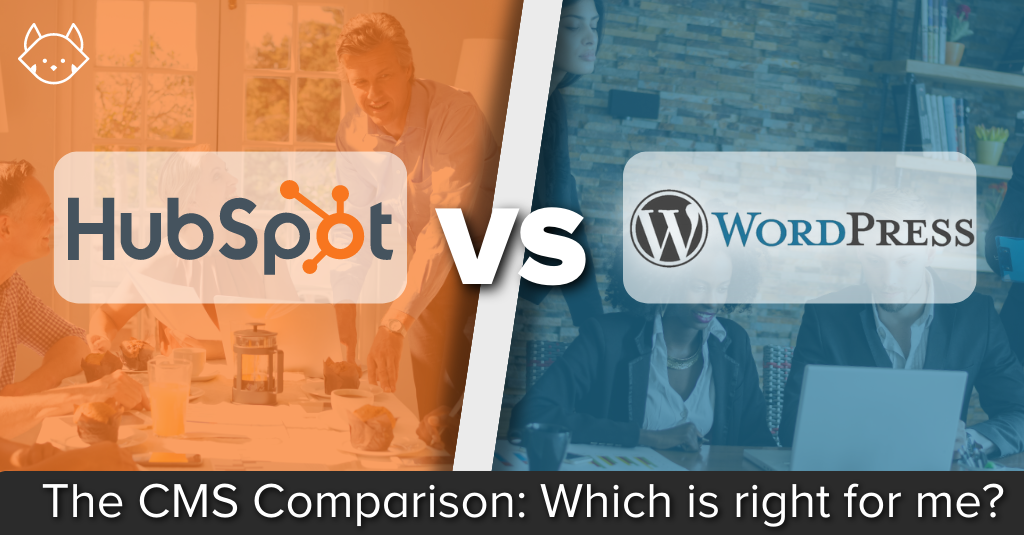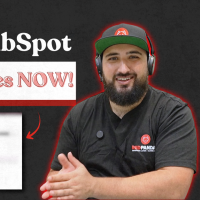If you don’t use HubSpot for your CRM and Sales software, what’s the next best choice? Many senior leaders like you have been down this path, questioning the effectiveness and value-for-money of their chosen software. Before taking the $1000+ per month plunge on HubSpot, it’s in your best interest to find out what the alternatives are, and how they stack up against HubSpot so that you can make an informed decision. In this article, you’ll learn about the 5 Best HubSpot alternatives.
Even if you are already sold on HubSpot, as a leader you need to be able to justify why HubSpot, above all other alternatives, is the technology stack you’re about to join at the hip with.
On the other hand, you may be doubting whether HubSpot is right for your business. In this case, it’s best to check your alternatives before making a decision. If you were looking to buy a home, chances are you’re going to want to explore every inch of every home you inspect, so that you don’t waste your money and regret your decision.
The same is true in this case. Whatever you choose, it’s going to cost you money, and ultimately time as your team needs to setup, learn and use the software you implement. There’s no use investing in something that’s going to receive negative feedback from your team on day one and chucked in the bin never to be used again on day two.
That’s why looking at your alternatives is a must. With that said, let’s dive into it.
What is HubSpot?
HubSpot is an all-in-one Marketing, Sales and CRM powerhouse for your organisation’s activities. From a systems point of view, HubSpot has the following ‘hubs’:
- CRM and Sales tools, called ‘Sales Hub’
. - Marketing tools such as email tool, landing page tool, chat tool etc called ‘Marketing Hub’
. - After sales support, ticketing and knowledge base tools called ‘Service Hub’
. - Ability to build your website in HubSpot called ‘CMS Hub’
. - App connector, database clean and business process automation tools called ‘Operations Hub’.
Hubs can be purchased on their own or in combination with each other.
From an outcomes point of view, CRMs, Marketing Automation and Sales softare like HubSpot (when setup correctly) helps organisations:
- Increase the bottom line
- Take advantage of opportunities more effectively and quickly
- See a single source of truth of all their data
- Close more deals faster
- Prospect more effectively
- Manage deals more effectively
- Increase company growth through the union of marketing and sales
More specifically, HubSpot’s benefits help it stand out from the crowd, which include:
- Contact record give companies a unified view of the customer across teams
- It’s easy to use – all the different hubs look and feel the same. When a CRM is easy to use, companies are 2.1x more likely to see company growth (HubSpot)
- It gives you full visibility of your marketing and sales efforts
HubSpot has various functionalities which make it perfect for organisations looking to utilise their resources more effectively for growth.
We have a bunch of resources available on our Learning Centre if you want to learn more about HubSpot. Check out some of our highlights below:
If you’re not using HubSpot yet:
- Why Should You Choose HubSpot for Your Business?
- How to convince your CEO or management that HubSpot is a good investment?
- Is HubSpot powerful enough for large enterprise companies?
- Is HubSpot a good investment for your business?
If you’re comparing HubSpot to other software (or if you’re thinking about an agency to hire for support):
- HubSpot vs Salesforce: Detailed Feature & Pricing Comparison
- Best HubSpot Agencies in Sydney
- HubSpot vs WordPress CMS: Which is right for me?
- HubSpot Marketing Hub Pricing
- HubSpot Sales Hub Pricing
If you’re already using HubSpot:
- 5 Best HubSpot Features
- How to Import Data Into HubSpot: A Comprehensive Guide
- How to prepare your sales team for HubSpot
- HubSpot Best Practices for Marketing Hub, Sales Hub, and CRM
Let’s take a look at the best HubSpot alternatives.
1. Salesforce
Out of all the alternatives on this list, Salesforce is the leading software alongside HubSpot. It has been a long-standing player in the CRM world and offers a comprehensive suite of sales, marketing, and service solutions.
Let’s look at the pros and cons of Salesforce.
Pros
- Complete customisability
Complete customisability
Salesforce provides a highly customisable platform that allows you to tailor the CRM system to your specific needs.
You can pretty much do anything you want to with Salesforce – there are no limits on customisability, and this is what truly differentiates Salesforce to any other option on the market.
If you’re an enterprise company or if you’ve got a very specific requirement that you can’t achieve without complete customisability of your CRM, Marketing and Sales software, then Salesforce may be a suitable option for your business.
Cons
- High costs
- Clunky system
- Ease of use
High costs
Salesforce can be very expensive. When you’re using Salesforce, you’re not only paying for the software, but also management fees. This is because the complexity of Salesforce requires an expert to help your business manage and maintain the software.
Here’s an example of what Salesforce might cost when compared to the equivalent plan on HubSpot:
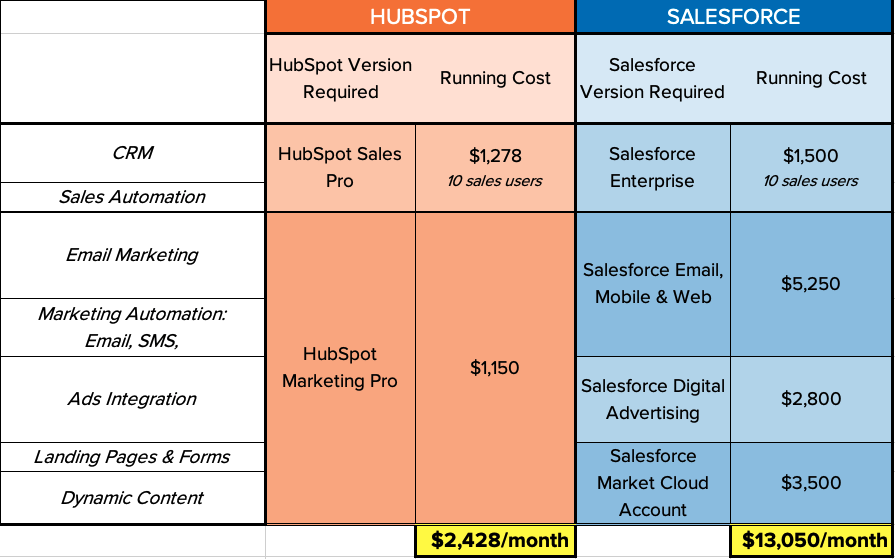
Clunky system
Salesforce is a CRM with sales tools, however it doesn’t have marketing tools within the same system. To centralise marketing with the CRM, you would need to go and purchase the Salesforce Marketing Cloud separately and plug it in.
However, this tends to be quite clunky and results in truncated systems, making it inefficient for marketing and sales collaboration.
Why is Salesforce Marketing Cloud so clunky? Isn’t it a seamless part of the Salesforce ecosystem?
Just because it is called ‘Salesforce Marketing Cloud’ doesn’t mean it was built as a natural upgrade by Salesforce. In fact, Marketing Cloud was an acquisition of ExactTarget and was rebranded in 2014. In 2022, Salesforce also rebranded another acquisition, Pardot, as Salesforce Marketing Cloud Account Engagement.
Although the rebrand of the many acquisitions Salesforce has made under the ‘’Marketing Cloud’ banner makes sense, it does explain why a lot of Salesforce features that should be seamless actually feel clunky and forced.

On the other hand, HubSpot’s Product Suites (called Hubs) were built with the platform as opposed to clunky acquisitions.
Ease of use
Because of the high level of customisability, the ease of use is quite low.
You may likely find that using Salesforce in your company will require external assistance from an expert in order to customise your software and manage it.
This will also mean increased training costs for your team so that they are able to use the software.
Overall, Salesforce ranks the lowest in terms of ease of use on this list.
Recap of Salesforce Pros and Cons
Pros:
- Complete customisability
Cons:
- High costs
- Clunky system
- Ease of use
Salesforce’s complete customisability makes it a compelling alternative for businesses that require very specific solutions that alternative software can’t achieve, or for enterprise companies that require customised solutions.
In saying this, we’ve never personally seen a use case where a company hasn’t been able to achieve their required level of customisability with HubSpot.
2. Active Campaign
Active Campaign is a potential alternative and can be compared to the Professional or lower plans on HubSpot. However, if you require features that the HubSpot Enterprise plan provides, then Active Campaign is not a suitable solution for your business.
Let’s take a look at the pros and cons.
Pros
- Marketing Features
- Affordable
Marketing features
Overall, Active Campaign provides the same marketing automation tools as HubSpot (on HubSpot’s lower plans).
Here’s a complete list of the marketing tools that Active Campaign provides:

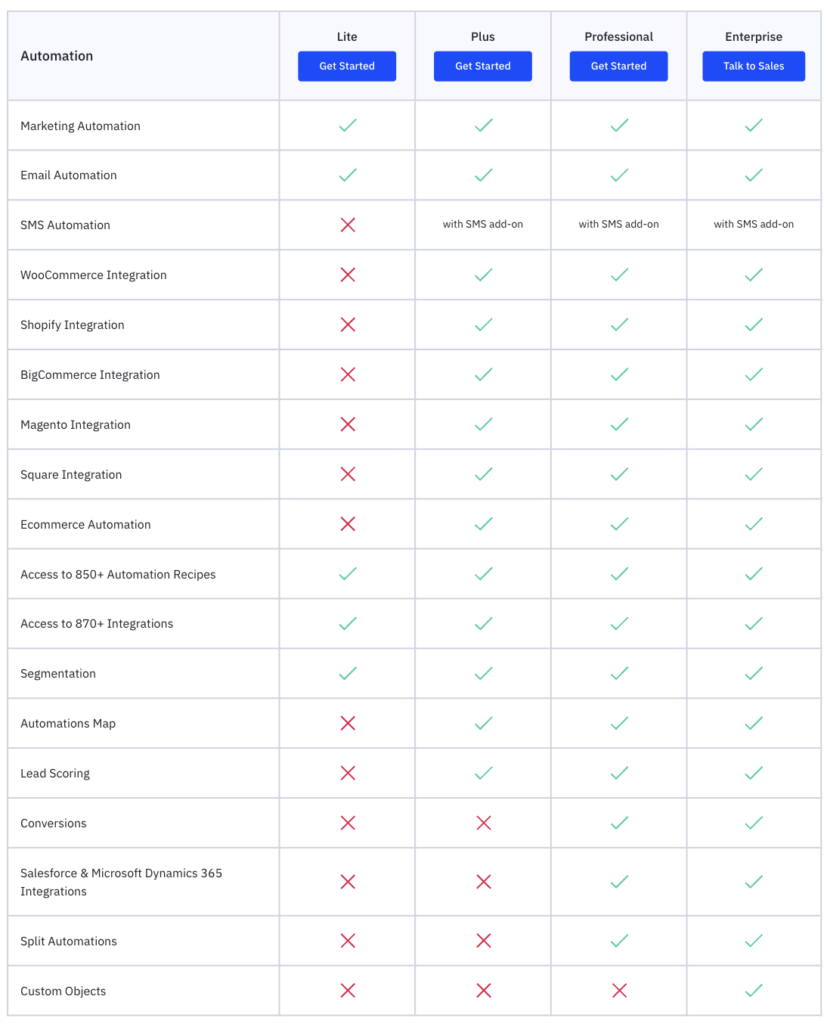
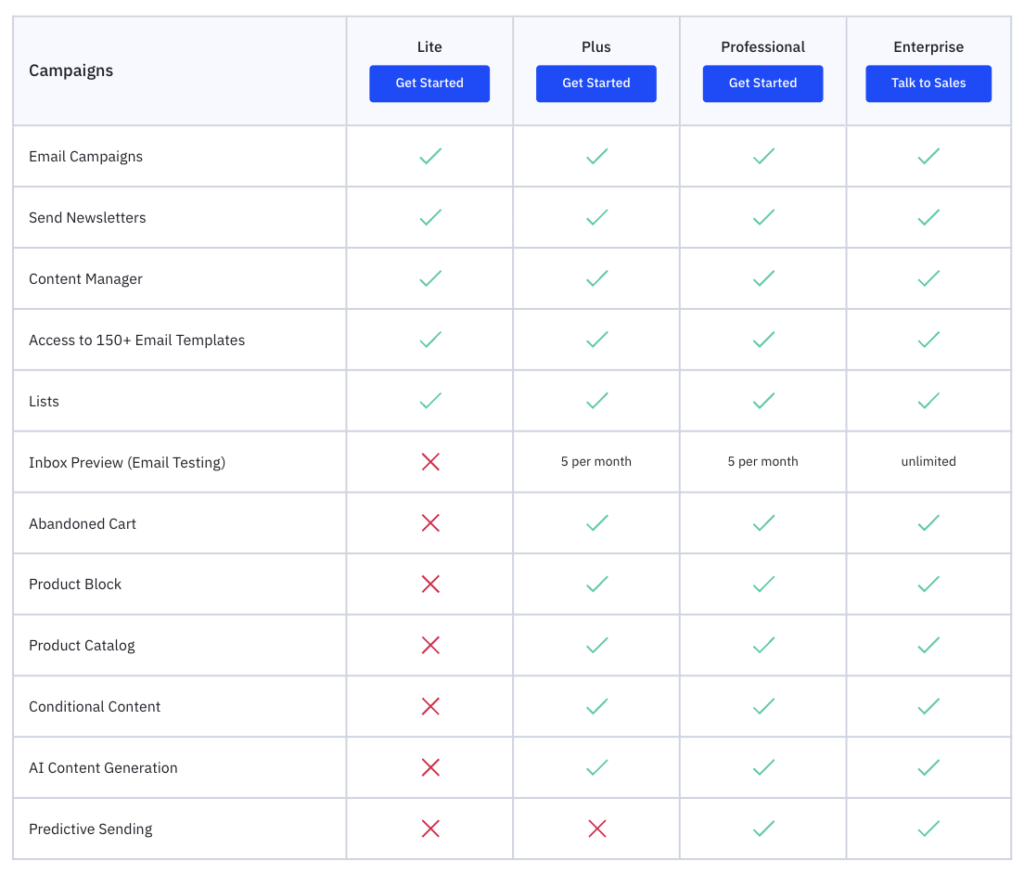

If your main focus is marketing automation and you’re not looking to also use Sales tools, then Active Campaign is a great alternative to HubSpot, and can save you quite a fee. However, if you’re looking to achieve more than just marketing automation, this may not be the case (more on this later).
Affordable
Compared to HubSpot, Active Campaign is very cheap.
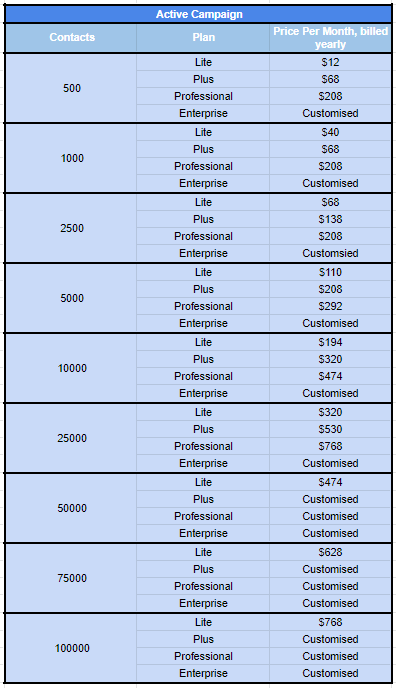
In comparison, this is what HubSpot’s Marketing Pricing looks like:

Bottom line: If you’re using Active Campaign, you’re likely going to be paying far less than if you were to use HubSpot. Depending on your requirements, this may be a good or a bad thing.
Cons
- Lacks extensive sales tools
- Reporting
Lacks extensive sales tools
From a sales perspective, Active Campaign provides pipeline management features. This works as a drag and drop editor, and you can create deals and tasks to manage your sales pipeline as needed.

From an ease of use point of view, it’s easy to get started and use this. However, from a features point of view, there’s not much else that Active Campaign can do for sales (other than lead scoring and custom objects).
In comparison, here’s a complete list of HubSpot’s sales features, separated by plan:
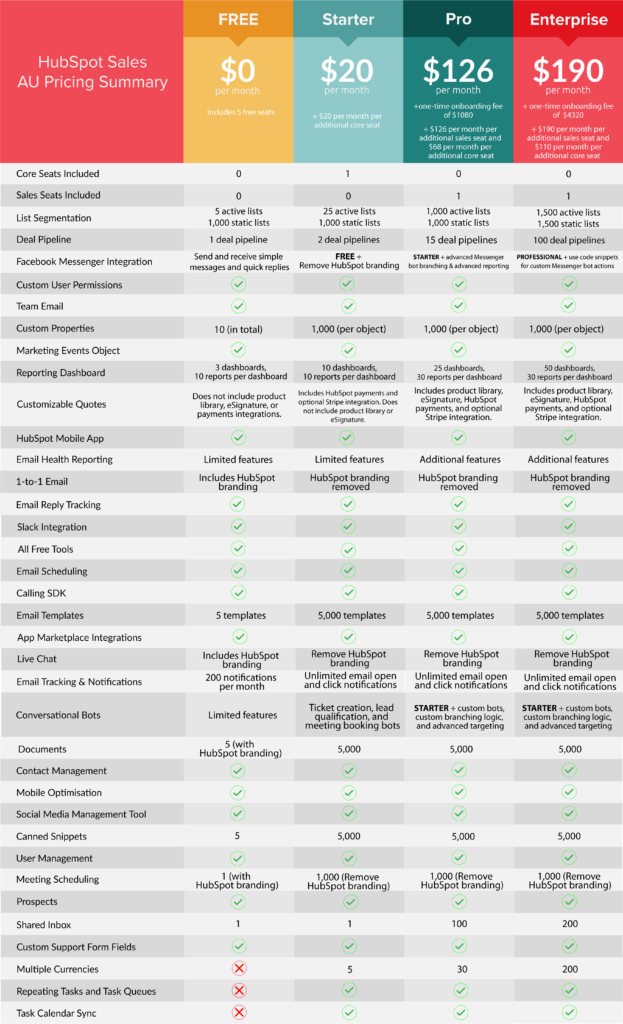

Reporting
ActiveCampaign lets you build reports on everything from automation performance and contact tags to chat conversations, email opens, sales funnels, deal conversions, and much more.

However, when compared to HubSpot’s reporting capabilities, Active Campaign falls short. For example, in HubSpot, you can report on multiple objects in one, such as a combination of contact and deal properties, or contact and company properties, or all three.
In saying this, if you just need basic reporting around your email marketing and website attribution (such as website conversions), Active Campaign is suitable.
Recap of Pros and Cons
Pros
- Marketing features
- Affordable
Cons
- Lacks extensive sales tools
- Reporting
Overall, if you’re looking for an affordable but powerful marketing automation software with basic CRM and Sales features, then Active Campaign is a great alternative for your business.
3. Zoho
Zoho is likely the best small business alternative to HubSpot. Let’s take a look at some of the pros and cons.
Pros
- Extensive suite of CRM, Sales and Marketing Features
- Affordable
Extensive suite of CRM, Sales and Marketing Features
For small businesses (and potentially mid-sized businesses depending on your needs), Zoho provides everything you could need to manage your CRM, Sales and Marketing.
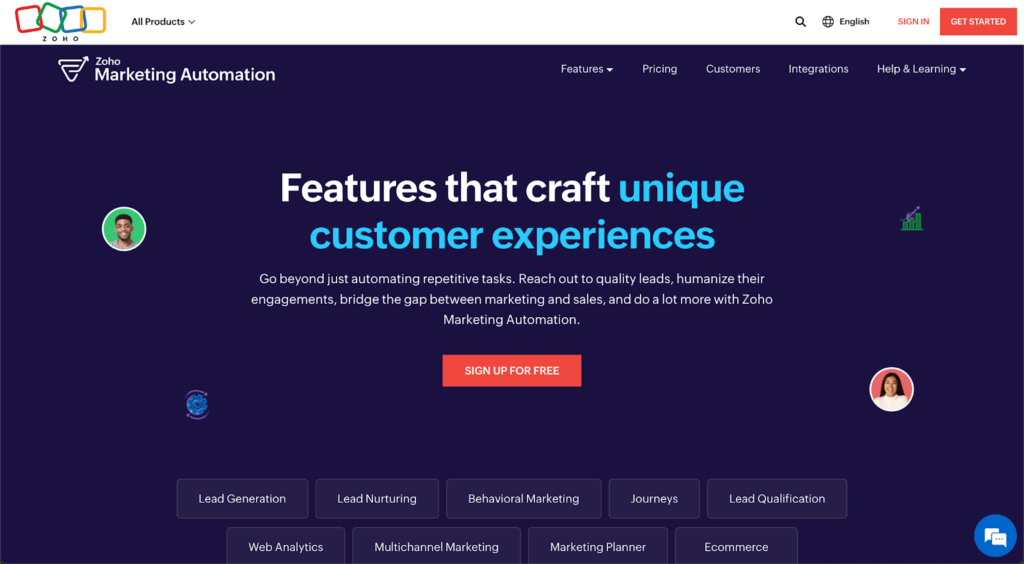
Zoho provides extensive marketing features broken up into 9 categories:
- Lead generation
- Lead nurturing
- Behavioural marketing
- Journeys
- Lead qualification
- Web analytics
- Multichannel marketing
- Marketing planner
- Ecommerce
Here’s an example of Zoho’s features and the corresponding pricing if you were to have 1000 contacts within Zoho:

From a sales and CRM point of view, Zoho also offers an extensive suite of features, broken up into various categories, as you can see in the video below.
All in all, Zoho comes behind Salesforce and HubSpot in terms of customisbaility and features, however it’s got a wide enough range of features to be suitable for you depending on your exact needs.
Affordable
Zoho is also more affordable than HubSpot. For Zoho, you will have to pay separately for the Marketing suite and Sales/CRM suite.
Sales/CRM Suite Cost

Marketing Suite Cost
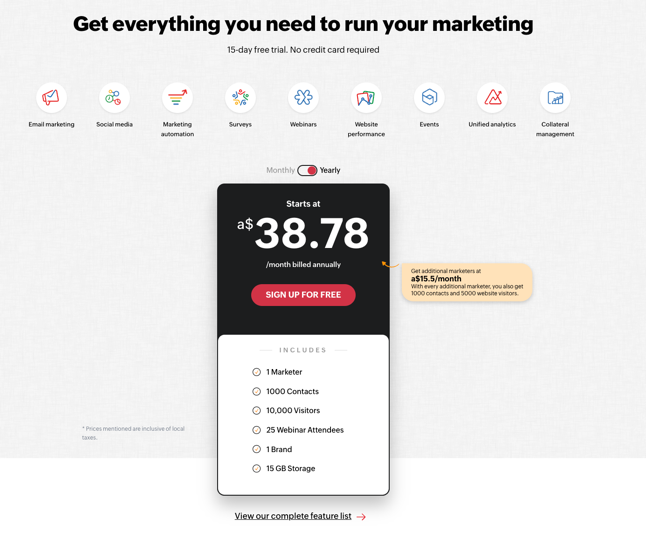
If you look more deeply into Zoho’s pricing options, you’ll find that they also offer bundle options and separate options if you want specific solutions. For example, if you only wanted email marketing tools, you could pay for a plan specific to that, which would save you significant costs.
All in all, Zoho is extremely affordable when you consider the extensive features that it provides.
Cons
- Truncated systems
- Less advanced features
Truncated systems
The Zoho CRM and Sales suite is separate from their Marketing suite, which means you’re working with truncated systems.
Rather than managing everything from the one place, you’ll have to navigate to a different Zoho product in order to use those features. This can be bad for a few reasons:
- Makes it harder to use
- Means that sales and marketing are separated, so sales team members can’t see what marketing team members can see and vice versa. This can make collaboration between marketing and sales difficult.
With HubSpot, all of the hubs are centralised in one place so that you don’t need to worry about this. However, given the price difference, you’ll want to consider whether this is something valuable for your business.
Less advanced features
Zoho offers a lot of features but the depth of their functionality proves limited as your demands increases. Ultimately, if you’re an enterprise business (or even a larger mid-sized business) you may find it difficult to achieve all of your goals with Zoho.
Recap of Pros and Cons
Pros
- Extensive suite of CRM, Sales and Marketing Features
- Affordable
Cons
- Truncated systems
- Less advanced features
Which CRM and Sales software is best for my business?
The answer to this question is as unique as your business.
It depends on your specific needs, budget, team size, and long-term goals.
If you’re an enterprise business, then you’re probably going to want to choose between HubSpot and Salesforce. On the other hand, if you’re a mid-sized business, then HubSpot or Zoho are probably the next best option. And for small businesses, Zoho or Active Campaign can be a better pick.
But the decision ultimately rests with you. Weigh your needs, evaluate these alternatives, and choose the one that aligns best with your business.
Are you an enterprise business wondering whether you should invest in HubSpot or Salesforce? Check out our full HubSpot vs Salesforce comparison here.


